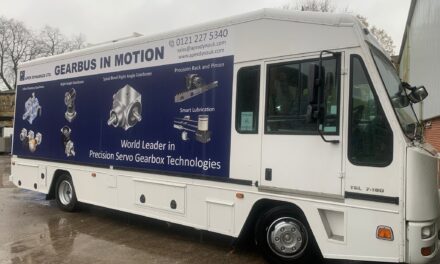 Designed for use off-road and in difficult conditions, the Mountain Trike wheelchair needed reliable components capable of withstanding tough environments. To meet the demands, the designer specified a clutch from Stieber, part of Altra Industrial Motion.
Designed for use off-road and in difficult conditions, the Mountain Trike wheelchair needed reliable components capable of withstanding tough environments. To meet the demands, the designer specified a clutch from Stieber, part of Altra Industrial Motion.
Although an essential tool for those with disabilities, standard wheelchairs are very limited in regards to the terrain they can handle. Uneven ground, steep terrain and mud mean simple activities like family trips to the park or even ambling along country paths can be difficult or even impossible in a regular wheelchair. Although some wheelchairs have ‘off-road’ tyres, they still require the user to push the wheels to move forward, which results in muddy slippery hands and poor transmission of drive.
Now, however, there is a manual wheelchair designed specifically for all terrain use combined with everyday practicality – the Mountain Trike, designed by Tim Morgan.
The Trike uses a lever drive system that allows the user to power, steer and brake the Trike using two levers which are positioned in front of them. The levers are connected to the wheels using similar technology to that found on a mountain bike and power each wheel independently. A third wheel at the back stabilises the chair and can be steered using a joystick mechanism attached to one of the levers.
Rather than a standard bike free wheel, Morgan specified an overrunning clutch to transmit the kinetic energy from the levers to the wheels.
Taking up the story, Morgan commented: “When the wheels are spinning freely on a mountain bike, without drive from the pedals, the freewheel clicks during the rotation. The Mountain Trike is intended for use during family walks and other lifestyle activities so I wanted to make sure it would run silently. I also found that bike freewheels have a small amount of free travel before they engage. Because the levers are quite long, this translated to several inches of free travel with each push, which was quite jarring for the user and resulted in less efficiency overall. Using an overrunning clutch eliminates both of these issues.”
While the initial overrunning clutches specified on early test models performed as desired short term, over long term use their durability was not up to the standard required. Poor seals meant that mud and contaminants could creep inside, which caused seizing, while the poorly machined internal components led to slipping and, eventually, total failure due to the regular shock loading caused by disengaging and engaging the drive train with every push.
Needing to source an alternative, Morgan turned to Stieber Clutch and was supplied with the CSK PP overrunning clutch for testing and found that the movement was much smoother.
Stieber Formsprag overrunning clutches are designed to be long lasting and reliable. The sprags are manufactured using the company’s patented ‘Formchrome’ process which diffuses chromium carbide into the working surface of the sprag, increasing its surface hardness substantially to deliver long term wear protection. They are also precision machined to ensure that each sprag is almost identical to the next to prevent uneven rolling movement.
The sprag retainer assembly features a free action design that permits each sprag to have free and independent action – allowing each sprag to adapt to variations in annular space so that when the clutch is engaged, the load is proportionally shared among all sprags. This eliminates the possibility of clutch damage resulting from the entire load being absorbed by just a few sprags. In operation, springs energise the sprags into position for instantaneous engagement with no backlash.
“During the testing process it was clear that the Stieber clutch offered far more in terms of reliable performance, so they are now specified as standard on all Mountain Trikes. Since they have been installed we have had no reported failures, even from some of our more adventurous customers,” explained Morgan.


